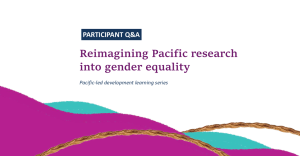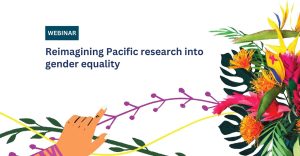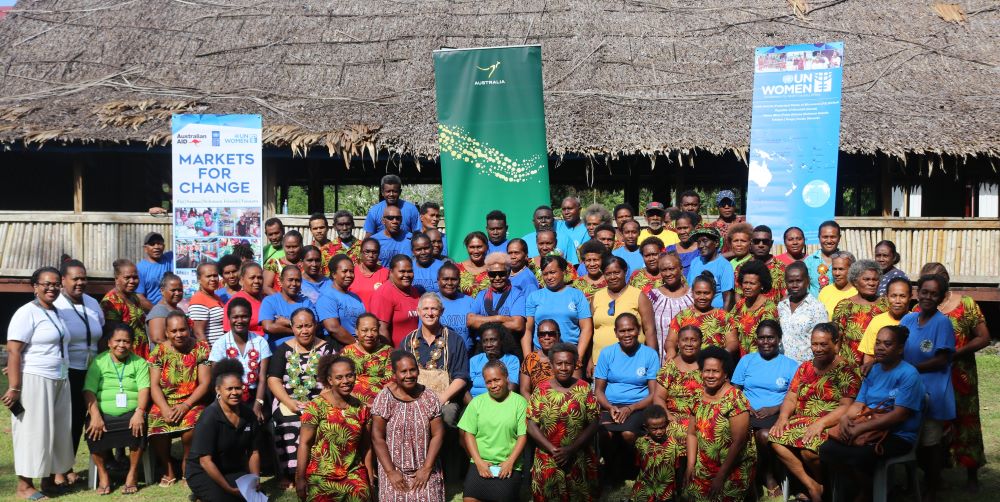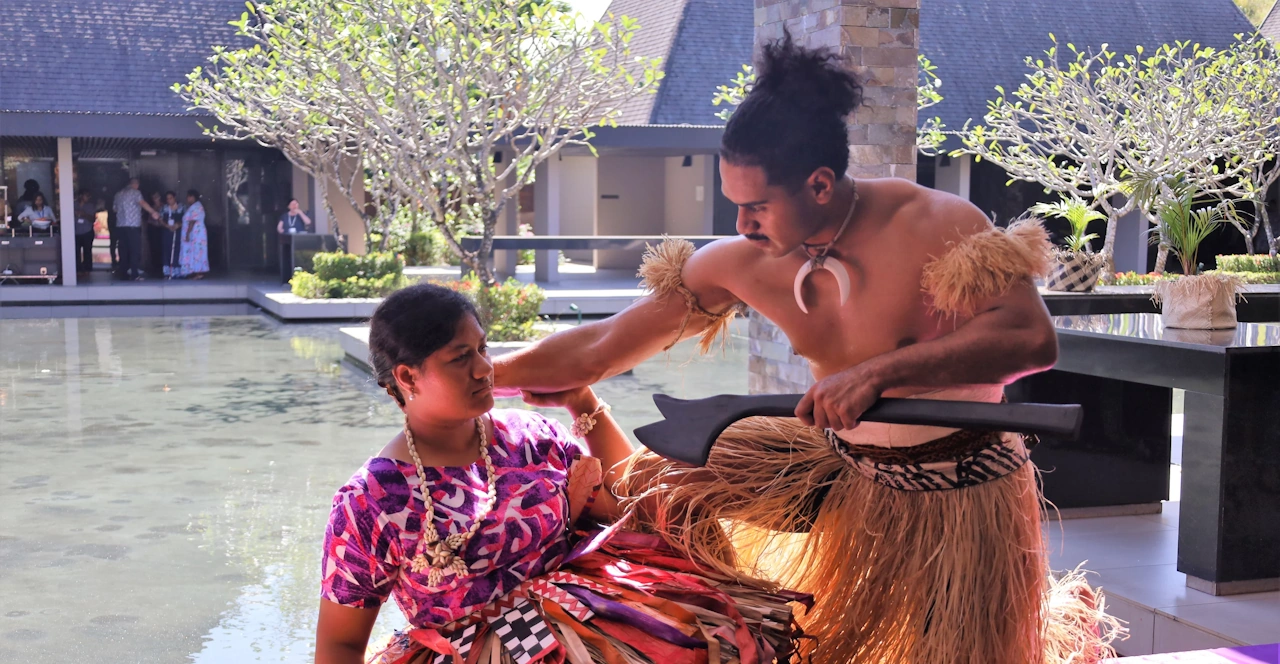Closing remarks by Mereseini Rakuita, Principal Strategic Lead – Pacific Women and Girls, SPC, at the Pacific Prevention Summit 2023
2 May 2023Preventing violence against women and girls: A message of hope
Closing remarks by Mereseini Rakuita, Principal Strategic Lead – Pacific Women and Girls, SPC, at the Pacific Prevention Summit – 28 April 2023
Acknowledgements
- Ms Stephanie Copus Campbell, Gender Equality Ambassador, Government of Australia
- Permanent Secretaries, Assistant Secretaries and Senior Government Officials from the 13 Pacific Island Countries represented in the room and online.
- Representatives of the PPEVAWG programme: The European Union delegation, Government of Australia, and Government of New Zealand, together with representatives of the Pacific Islands Forum Secretariat, UN Women and my SPC Colleagues.
- Movement Makers, CSO, regional feminist and women’s rights organisations from across the Pacific.
- Faith leaders and change makers from across faiths.
- Phenomenal sport leaders and practitioners.
- Researchers and academics.
- Development partners and donors.
- Ladies and gentlemen.
————
I stand before you today with a great sense of hope, optimism, and gratitude. I am hopeful, optimistic, and grateful for your collective commitment to find a way forward to create a blue Pacific where all women and girls, in all their diversity, are not only safe, but can also equitably share resources, opportunities and decision-making with men and boys.
Over the course of the week, we discussed the detrimental impact of violence against all women and girls in the region. Pacific women and girls experience violence and abuse at the hands of men they know—often in their own homes and often repeatedly, sometimes over many years, if not a lifetime. The murder of women and girls, especially in the context of domestic and family violence, is often the final result of a long history of abuse. This situation is unacceptable and requires a bold and ambitious response at the regional level to guide work at national level.
This week’s Summit is a step in that direction. I say that with the acknowledgement that countries, institutions, and organisations represented here today have done great work at national level – consolidating national efforts for prevention of violence against women and girls. Like every journey, the steps must continue – it cannot and must not start and stop at this one step, and as we were reminded, we must not reinvent the wheel.
Moments of this week were very emotional because this issue directly touches all of us in one way or another. Yesterday, for example, we were reminded of the origins of Thursdays in Black – a moment of peaceful protest and resistance to gender-based violence and abuse. And we heard stories of resilience, stories of power and stories of change. We explored evidence from the region, by the region. We heard from regional and global experts who shared their expertise while recognising the strength of the Pacific’s journey and existing bodies of work.
We did not shy away from difficult conversations, and I hope we will continue to have difficult conversations, because the issue of violence against all women and girls requires nothing less than our full effort and commitment to navigate through discomfort and challenges. In fact, the topic of violence against women and girls necessitates us having those difficult conversations not only with the members of the communities we live in but also with those who hold the power to make changes in our communities. Our women, girls, children, and communities of the Pacific deserve nothing less.
We reminded ourselves of the stars that guide our path in this journey – human rights, a root cause analysis, principles of feminism, decolonising our approach and the urgency of equal, meaningful partnership.
We traced our journey over the last 40 years – almost half a century – in an effort to locate ourselves: to understand what is already working, explore where we need to expand and grow and imagine what our future can look like. To that end, I would like to acknowledge those powerful women who started this journey four decades ago in the Pacific and those who have joined the movement later to make it what it is today. Some of them have been with us throughout the week enriching the discussions and outcomes of this meeting. A key theme in our Summit has been reflecting on our journey – from where we came from, where we are now and where we envision ourselves to go. Many of you have contributed to the history wall. We would like to gift the history wall to the Ending Violence Against Women and Girls (EVAWG) movement makers and civil society movements for them to continue to hold and weave our story and our narrative.
And most importantly, we discussed how violence against women and girls can be prevented within our lifetimes if we join together and act in the spirit of true solidarity and true partnership. There is considerable scope for us as individuals, communities, and leaders to prevent violence against all women and girls before it occurs and stop it before it starts.
Global evidence confirms that gender-based violence (GBV) is ultimately preventable and preventable within years, not lifetimes, if an evidenced-based, whole-of-population, whole of government and inclusive approach is advanced.
Being a part of this Summit has expanded my thinking and my horizons when I think of what we must do and what we need to do if we are to be bold, ambitious, and relentless in our endeavour to end violence against all women and girls.
First, we must think holistically. Stopping violence before it starts requires all of us and many others who are not with us in the room.
To our faith, sport and education partners – we need you. You are the thread that keep our communities together. You have the power to give promise to a little girl to be whoever she wants to be without fear of being harmed or put down. You have the power to support our young boys and men to become the fullest, most compassionate version of themselves. We have heard powerful and inspirational stories of change, and how effective small-scale community based and led projects have been in changing men as perpetrators.
To our policymakers and government counterparts in the room – you hold the levers of change to forward an enabling environment and a society that accepts nothing less than an end to gender discrimination. In forging that enabling environment you must acknowledge that you cannot do it alone; you must partner with non-government organisations that have been and continue to leverage efforts on the ground on response and prevention work if you truly want to leave no one behind.
To the women’s rights movement makers, human rights defenders, and feminist movements in the room, we would not be here without you. From a deep sense of passion, politics, and ethics – you are the ones who imagined what our future could be. We need your voice, your analysis, and your critique to push all of us and keep us accountable.
To our donor, CROP and development partners, you’ve heard what the people of the Pacific need and you’ve heard the values and principles that guide this work. I hope you align yourselves to what has so clearly been articulated over these five days.
Second, we must stay true to what we know works. Prevention and response work go hand in hand. Any work in this space must remain accountable to the lived experiences of women and girls in all their diversity and to the social justice movements that shaped progress in this space. Stopping violence before it starts is long term, intensive and comprehensive work – you must be in it for the long haul. Stopping violence before its starts requires investment both for interventions as well as evidence-generation. Preventing violence requires multi-pronged interventions at household, community and societal levels so that we address the root cause of patriarchy at all levels.
Third and finally, the most transformative prevention approaches in the Pacific and globally are grounded in human rights, intersectionality, feminist principles, do no harm and a survivor-centred approach. While we navigate how these principles are put into practice in our diverse local contexts and realities across the region, we cannot compromise on them.
Friends, at its core, violence against women and girls in all its forms is a manifestation of gender inequality, men and boys’ power and control over women and a failure to recognize the inherent equality and dignity of all women and girls. It is about patriarchy and the societies we live in where violence is a part of all our daily lives.
Knowingly or not, we give our boys license to act abusively and it’s up to girls to adjust accordingly. We dismiss boys’ aggression as a function of their masculinity, and we rationalise it. The more we conform to gender stereotypes – masculine: strong, assertive, and powerful; and feminine: submissive, pretty, and weak, the conditions remain ripe for Pacific men and boys to exert power and control over women and girls– power we covertly tell our boys is theirs through tradition, socialisation, and role models.
Together we can put measures in place to stop violence before it starts, such as building safe spaces in schools and workplaces, promoting positive family relationships, encouraging women and girls’ empowerment, empowering our young people, and teaching boys that strength comes from respect and integrity, not from violence. We must do all we can to be part of the answer and create a society in which no woman and girl will live in fear of violence, and every girl will grow up knowing she is safe and equal. That is the aim and I look forward with strong commitment to working with you all to achieve this. That takes all of us working at the same time, towards the same goal. All Pacific Islanders, men, women, boys and girls! It will take a holistic, comprehensive, and long-term approach. Friends, it can be done!!
If you have been in this room this week or joined us online, that means that you are already doing work in the area of gender based or family violence – I thank you for your commitment. If you have been in this room this week, it also means that you have the power to contribute to our common quest to stop GBV before it starts. My question to you is – What are you going to do about that power when you leave this Summit? What are you going to do differently to impact more meaningfully on your country’s efforts to stop GBV before it starts?
In our own way, each of us in this room has overcome struggles to get to where we are. You are inspiring. You have shown the potential that our Pacific Island countries and communities have if just given the chance. Your leadership is needed. Your voice is needed.
Please join me in taking the strengths, new knowledge, and renewed commitment of our five days together to advocate for the prevention of violence against all women and girls in the Blue Pacific. As we go our separate ways, I hope you will keep the spirit of this Summit with you, and I hope the learning and dialogue has fostered new friendships and deepened existing ones. It has been an honour to spend this time with you. Vinaka vakalevu.
The Pacific Prevention Summit, which took place in Fiji from 23 to 28 April, was a gathering of governments, civil society organisations, communities, and other partners to reflect, share, learn and strategise on what works to prevent violence against women and girls in the Pacific, especially where we play, pray, learn, and engage. The Summit was hosted by the Pacific Community, UN Women, and the Pacific Islands Forum, through the Pacific Partnership to End Violence Against Women and Girls (Pacific Partnership), funded primarily by the European Union, the Governments of Australia and New Zealand, and UN Women
News Category
Speeches
Division
Human Rights and Social Development
Categories
Speeches
Countries
Fiji



